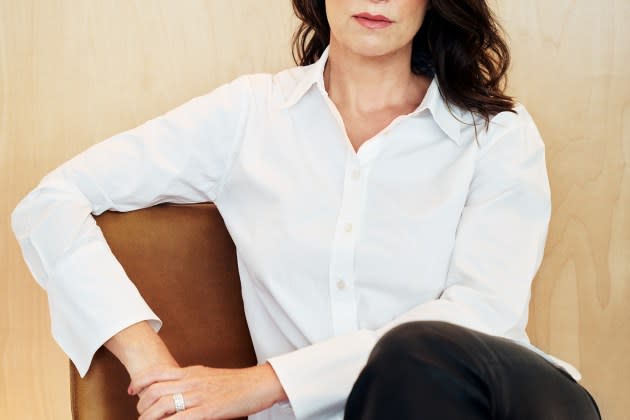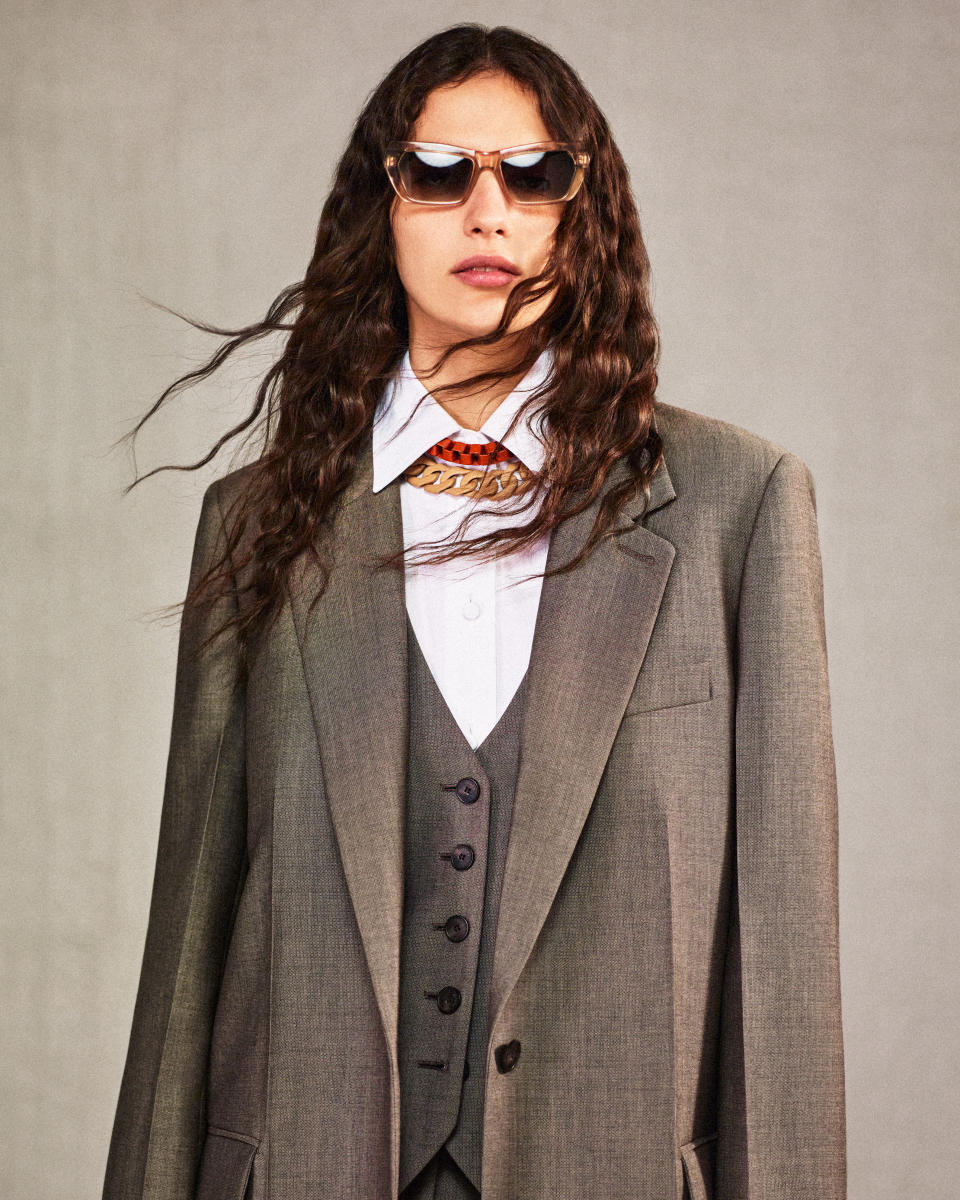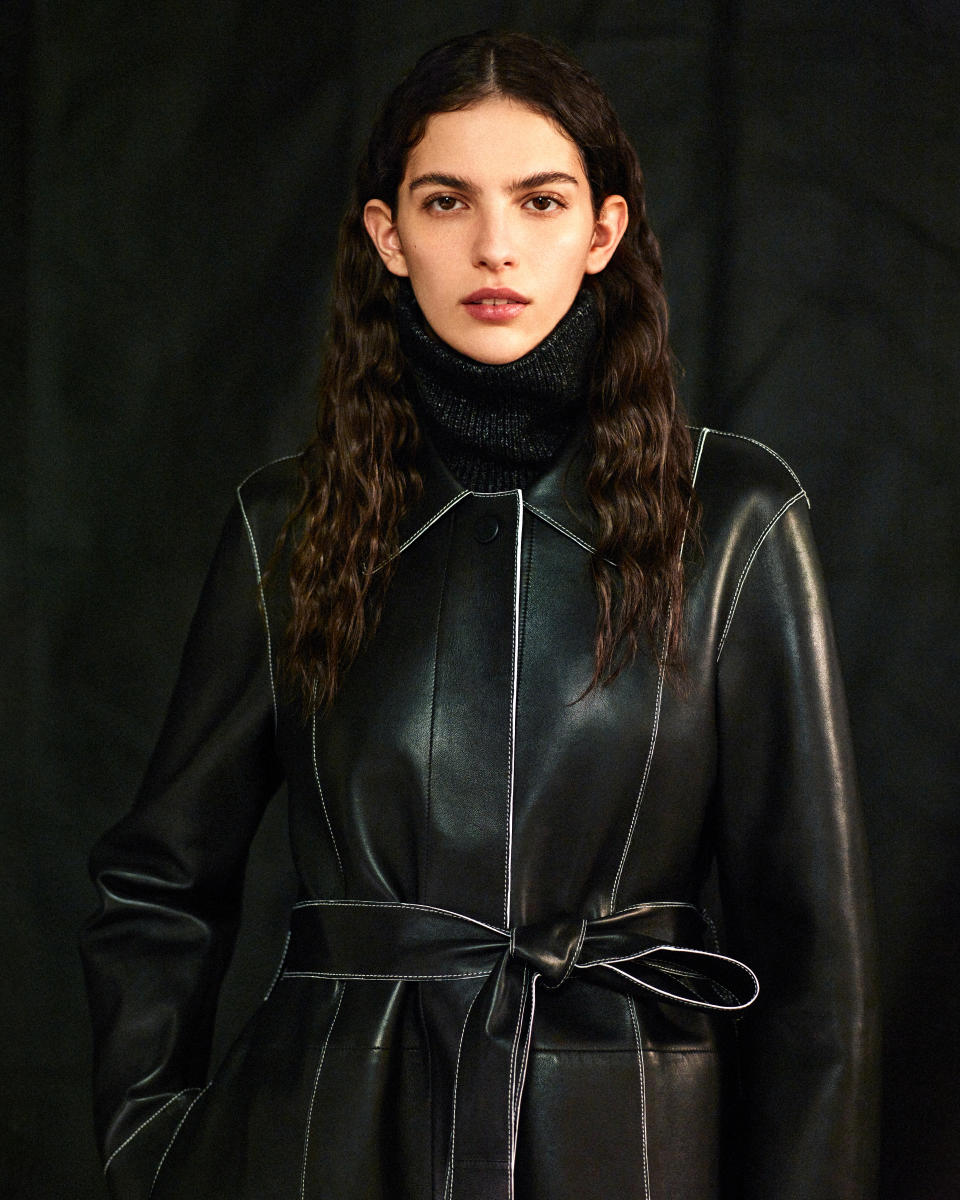CEO Talks: Barbara Campos of Joseph

LONDON — Against the odds of British fashion — and there are many — Barbara Campos has turned around the 40-year-old brand Joseph, which will post an operating profit for the first time since 2015 and open a new-generation store at 124 Regent Street here in October.
The fallout from lockdown and steep interest rate rises has created a hostile environment for many London-based businesses, and the cost of living crisis is forcing consumers to think twice about their spending.
More from WWD
Burberry Taps 'Barbie' Actor Emma Mackey for New, Refillable Fragrance
Ian Meakins to Replace Nils Andersen as Chair of Unilever on Dec. 1
By contrast, Joseph, which was founded in the ’80s by the later retail whiz Joseph Ettedgui, is thriving, thanks in large part to Campos, the company’s chief executive officer.
The French fashion executive studied at Harvard Business School and has held top commercial and marketing roles at brands including Diane von Furstenberg, Furla and Hugo Boss. She joined the loss-making Joseph in 2018 and began restructuring with support from Onward Kashiyama, which has owned the brand since 2005.
In 2020 Campos made the unconventional choice of promoting Anna Lundbäck, already a member of Joseph’s design team, and Lundbäck’s husband Frederik Dyhr, former global creative director at Tommy Hilfiger, as co-creative directors of Joseph.
Together the team set about fulfilling Ettedgui’s original mission of creating a practical, luxury wardrobe that embodied stealth wealth decades before “Succession” hit the small screen.
Recapturing the spirit — and success — of the original brand has been no easy task.
The original Joseph stores stocked designer brands including Alaïa, John Galliano and Margaret Howell. Those labels sold alongside the in-house Joseph collection, which was famous for its luxe basics and terrific tailoring.
It quickly developed a cult following and by 1997 Ettedgui was selling up to 2,000 pairs of his famous stretch, bootcut trousers each week out of his five London stores.
The ethos of those first Joseph collections remains the same, but the brand is now operating in an increasingly competitive environment brimming with well-funded international designer brands. While Joseph is on a road to recovery, there is still a long road to travel.
In 2022 turnover grew 30 percent to 47.1 million pounds. Operating profit was in excess of 366,000 pounds, compared with a loss of almost 9 million pounds in the previous year. The company drastically pared its after-tax losses, too.
Looking ahead, Campos wants to double the size of the business in the next five years through Joseph’s 24 stores and more than 400 stockists, which include Net-a-porter, Matchesfashion, Mytheresa and Neiman Marcus.
Here, Campos talks about the turnaround, her ambitions for the company and her X-ray vision for fabrics and tailoring.
WWD: Why did you join the company, and how did you approach the turnaround?
Barbara Campos: I joined because of the brand’s reputation, and because it was really dear to my heart. I did not have a clear strategy when I started, although I knew it was in need of attention. Profitability was in decline, as was the brand positioning.
I spent my first 100 days observing the business and talking to all our employees. I came to the conclusion that we needed to tap into the legacy of what Joseph Ettedgui left. It meant that products needed to serve a purpose in a woman’s wardrobe, and the business needed to be profitable and to stand on its own.
If we thought someone, or something, wasn’t right, then we’d make a change. We changed a lot of our suppliers, paid more attention to the craftsmanship and quality of the clothing. We re-looked at everything we were doing.
WWD: You also met with Isabel Ettedgui, Joseph’s widow, who owns and runs the Connolly clothing and accessories shop in Mayfair.
B.C.: I wanted to understand a little better who Joseph was, and I learned that he was a transformer. He started his London career as a hairdresser and Isabel said he loved the idea that you could transform a person just by cutting their hair. She also said that, sometimes, when they were invited to people’s houses, Joseph would look at the living room and ask “Do you mind?” and then proceed to rearrange the furniture and transform the space. That’s what we set out to do, to transform. He’s stayed in our mind. We continue to celebrate him.
WWD: In 2020, you made an unconventional decision, choosing Anna Lundbäck and Frederik Dyhr, to be co-creative directors of the brand. How is that working out?
B.C.: It was Anna who proposed bringing her husband into the role of co-designer, which I thought was interesting. Once we met, it made so much sense because there was a symbiosis of the right and left brains. She brings her creativity and expertise in womenswear, and he brings his expertise in tailoring and menswear. Frederick also has business acumen and brings a commercial angle to the product. The two of them represent the duality of the Joseph brand: black and white; London cool and Paris chic, and design with a relaxed silhouette. Everything just came together.
WWD: You were well on the way to transforming the brand when COVID-19 struck. How did you navigate lockdown?
B.C.: I’m very proud of how we worked during COVID-19. We managed to stay calm as a team and we didn’t make any knee-jerk decisions. We had to act quickly and review our plans — and our business model. It was an exhausting — and interesting time. Our entire business just stopped. We shut the warehouse, and we couldn’t ship the orders for at least two-and-a-half months.
It also gave us a lot of opportunity. It forced us to reexamine some areas of the business and to accelerate plans that were in the pipeline. We had to prioritize. We reached out to our landlords, suppliers and retail partners to find compromises. We wanted to continue being a reputable company. We wanted to show respect for the people whom we support, and who supported us.
WWD: What sort of audience are you speaking to now? Has it evolved over the years?
B.C.: We are beyond designing for a particular target woman or age group. We’re designing for an aesthetic. Our woman is in search of an idea. We’re designing clothes for the days where you don’t feel great, but you still need to look great. The clothes need to be like best friends, making you feel good and confident. They need to be effortless, and no-fuss. And we’re obsessed with being best in class.

WWD: Can you talk about the upcoming Regent Street store?
B.C.: We are celebrating our 40-year anniversary this winter, and we want to grow our retail footprint. Regent Street will open in October. It is such an iconic street, and a great opportunity to display our brand to a global audience and to enhance the Joseph halo outside the U.K. We are opening with a new concept that we will be rolling out across all of our locations in the next few years.
In terms of design, we definitely wanted something warmer and more organic than we’ve had previously, and with more natural materials. The store will also feature different textures which resemble those in our collection. It’s an important element of the concept.
There’s still an enormous opportunity for us at Joseph, not just in the U.K. but in Europe and in the U.S., which is really where we are seeing growth at the moment. And we’ll continue to bring consistency to the momentum that we’re achieving today.
WWD: Given the big opening in October, and your 40th anniversary, are there any plans to return to the London Fashion Week runway? The brand has not shown here for quite a while.
B.C.: There are no plans at the moment. Our priorities are elsewhere. Over the past two seasons, we’ve started to do direct-to-consumer marketing and have put a lot of investment into our image, the website and on digital marketing. We have been working with a couple of influencers and that’s something we definitely want to pursue. They can be great ambassadors for a brand.
WWD: You spent most of your professional life at marquee fashion companies in Europe and the U.S. Can you talk about how you have brought your past experience to bear on his job?
B.C.: I acquired very different skills from those companies, but I would say there have been three key moments so far in my career, at DVF, Furla and Hugo Boss. Working in New York for DVF, I really learned about risk taking. They are always making decisions. There is also this idea of the American dream — nothing is impossible. If you try something and it doesn’t work, you try something else. And you keep doing it until you find success. Agility and resilience is something that I acquired and brought to Joseph.
At Furla, what I really enjoyed was the way that Italians find creative solutions to a problem. They are really resourceful. Working with Hugo Boss in Germany taught me about the discipline of execution and respect for the product. Hugo Boss also taught me about the importance of culture. We were literally breathing Hugo Boss.

WWD: Who have been your mentors over the years?
B.C.: I have three. One was my first boss at Hugo Boss, who is now retired. Aside from his business acumen, he knew the technical details of the product. He taught me everything I know about fabrics, about how you construct a jacket, a pair of trousers, a coat. He knew everything about the knitting techniques of wool, of cotton — it was incredible what I learned. Even today, I can [look at a fabric] and tell you the percentage of silk in a wool-silk mix.
My second mentor is the former CEO of Joseph, Sara Ferrero, who was my boss at Furla. She and the Furlanetto family have been really instrumental in the development of my career. They really believed in my potential and gave me tremendous amount of opportunity, given how young I was. Sara was extremely demanding but also supportive and she taught me to have a great attention to detail.
The third is Diane von Furstenberg, an incredible woman. She’s successful, charming, full of energy. She’s honest, she shoots straight from the hip, but is also extremely supportive. She’s proud to be a woman and proud of the achievements of other women. And she has a great sense of humor.
WWD: What is the first question you ask someone that you are interviewing?
B.C.: I think what interests me the most is why someone wants the job. Why did they apply in the first place? I think the answer really helps you understand the level of engagement, motivation and passion they have for a particular role.
WWD: What do you do in your spare time, when you aren’t turning around businesses, or examining fabrics?
B.C.: I love spending time outdoors, and one of my favorite elements is water, so you’ll find me on a boat, wakeboarding, kite surfing or swimming. I’m also particularly interested in animals. I used to compete in [equestrian] eventing when I was younger.
I love dogs as well, and at the moment I’m training my own dog, a Dobermann, to compete in working trials [an activity where the animals are trained as if they were police dogs]. I have a particular interest in animal behavior, and at the moment I’m studying to be an instructor and behaviorist at the Cambridge Institute of Dog Training.
Best of WWD

